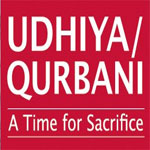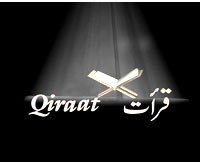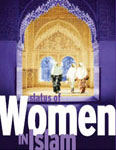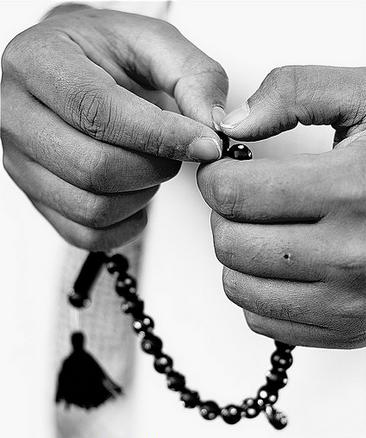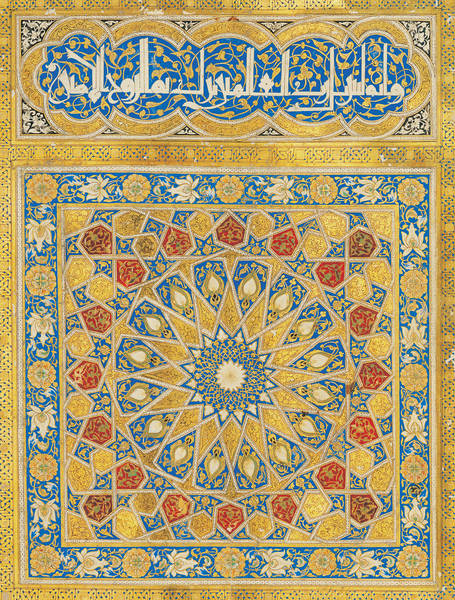- The Spirit of Qurbani (Udhiya)
- Virtue of Qurbani (Udhiya)
- On whom is Qurbani (Udhiya) Wajib (Obligatory) ?
- The Physical Qurbani (Udhiya)
- Time of Qurbani (Udhiya)
- The Qurbani (Udhiya) Anmial
- Animals with Defects
- Miscellaneous Masaail
- Method of Slaughtering an Animal
- Dua’a (Before, During & After Slaughtering)
- The Meat of the Sacrificed Animal
- The Skin of the Qurbani (Udhiya) Aniaml
- Warning for those who Ignore Qurbani (Udhiya)
- Qurbani (Udhiya) on behalf of Rasulullah (sallallahu alayhi wasallam) or any Deceased Muslim
- The Takbeeraat of Tashreeq
The Spirit of Qurbani (Udhiya)
“It is neither their flesh nor their blood that reaches Allah, but it is your Taqwa that reaches Him…” (Surah Hajj)
Hazrat Ebrahim Alayhi Salaam had two alternatives: either to follow the cry of his heart or to submit to the call of his Creator. He chose to submit. Qurbani therefore is not a monetary Ibadah or a duty that is discharged in distant poor countries. Qurbani is a personal experience, an intimate and emotional encounter, an intimate occurrence made real by the oozing of blood.
Qurbani is about:
- Love for Allah in contrast to love of the self obedience over rebellion.
- Loyalty to Allah in preference to loyalty to the family.
- Faith versus emotion.
- Struggle as opposed to pleasure.
Where is this spirit of Qurbani in our idle and aimless nights and days? Who is able to place the knife on his heart in order to slaughter the beasts of rebellion, hatred, jealousy, pride, and greed etc.? Qurbani is an annual reaffirmation of our pledge to Allah, a pledge that:
“Verily my prayer, my sacrifices, my life and my death are surrendered to Allah; the Rabb of the worlds.”
Eid-ul-Adha reverberates with the cries of surrender, submission, and sacrifice. It is a grim reminder that life is about action, struggle, and endurance.
Virtue of Qurbani
Qurbani is a practice directly instructed by Allah Ta’ala: “So turn in prayer towards your Lord and sacrifice (animals).” (108.2)
Rasulullah Sallallaahu Alayhi Wasallam too has extolled its virtue in many Hadith. There is nothing dearer to Allah Ta’ala during the days of Qurbani than sacrificing of animals. The sacrificed animal shall come on the Day of Judgment with its horns, hair, and hooves (to be weighed). The sacrifice is accepted by Allah before the blood reaches the ground. Therefore sacrifice with an open and happy heart. (Tirmizi, Ibn Majah)
Zayd lbn Arqam Radiyallaahu anhu relates that the Companions Radiyallaahu Anhum queried, “O Rasulullah Sallallaahu Alayhi Wasallam, what is Qurbani?” He replied, “It is the Sunnah of your father Hazrat Ebrahim Alayhi Salaam.” They again asked, “What benefit do we derive from it?” He answered, “A reward for every hair (of the sacrificed animal).” “And (what reward is there for animals with) wool, O’ Rasulullah Sallallaahu Alayhi Wasallam?” they asked. “A reward”, he said,
“for every fibre of the wool. (Ibn Majah)
When a person slaughters a Qurbani animal, he is forgiven at the fall of the first drop of blood, and verily, the animal shall be brought forward on the Day of Judgment with its blood, meat, limbs, etc. and shall be increased in weight seventy times, and then placed on the scale of deeds. (Kanzul Ummal)
On whom is Qurbani Wajib (obligatory)?
Qurbani is Wajib (obligatory) on every Muslim who is
- of sound mind – mature (has reached the age of puberty),
- Muqeem (i.e. he is not a Shari traveller)
- Possesses the amount of 612, 36 grams of silver or wealth equivalent to that value which is in excess of one’s basic needs and debts on any of the three days of Qurbani. It is not necessary that this amount be in one’s possession for a complete lunar year. (Fatawa Hindiyyah)
Note:
- Qurbani is not incumbent on a child or an insane person whether they own wealth equivalent to the amount above or not, nor is it Wajib upon their guardians to perform it on their behalf. (Fataawa Mahmoodiyyah)
- Similarly, it is not Wajib on a musafir (one considered a traveller in Shariah). A Shar’i traveller is he who proceeds on a journey with an intention of travelling 77 kms. He will be treated as a traveller as soon as soon as he departs his town. However if he intends residing at any place for 15 days or more then he will cease to be a traveller there. (Fataawa Hindiyyah)
- A person upon whom Qurbani is not necessary should not incur debts beyond one’s capacity to offer the Qurbani.
- If Qurbani is not compulsory on a person, for example, a musaafir then it is virtous to do so if it is within the person’s means
The Physical Qurbani
During the days of Qurbani, Sadaqah and charity will not compensate for the physical observance of Qurbani. Just as Zakah cannot compensate for Hajj, nor fasting compensate for Salaah, similarly charity cannot compensate for Qurbani. However, if the days of Qurbani have passed, and the Qurbani was not offered due to ignorance, negligence or for some other valid reason, then it becomes Wajib to give in Sadaqah the price of Qurbani animal or the unslaughtered animal itself to the poor. (Fataawa Shaamiyya)
Time for Qurbani
The time for Qurbani begins after the Eid Salaah on the 10th of Zul Hijjah and ends at the setting of the sun on the 12th of Zul Hijjah. It is better to make Qurbani on the first day then the second, and thereafter the third. (Fataawa Shaamiyya)
In rural and village areas where Jumu’ah and ‘Eid Salaah are not performed, Qurbani may be performed as soon as Fajr (Subhus Saadiq) sets in on the 10th of Zul Hijjah. (Fataawa Hindiyyah)
If a person residing in a town (where Eid salaah is performed) arranges for his animal to be slaughtered in a village (where Eid Salaah is not performed), then it is permissible for his animal to be slaughtered before he performs his Eid Salaah. (Fataawa Shaamiyyah)
If the Qurbani has been offered before the ‘Eid Salaah, it will have to be repeated. (Fataawa Hindiyyah)
It is preferable to slaughter during the day. (Fataawa Hindiyyah)
The Qurbani Animal
It is permissible to slaughter a goat, sheep, cow, bull, buffalo or camel, male or female for Qurbani.
The minimum age of:
(a) A goat, sheep, or ram is one full year,
(b) A cow, bull or buffalo is two years old, and
(c) A camel five years.
- Animals that are younger than the prescribed age are not suitable for Qurbani. (Fataawa Hindiyyah)
- If a sheep is more than six months old but less than a year, and physically appears to be one year old it will suffice for Qurbani. (Fataawa Hindiyyah)
- A cow, bull, buffalo or camel will suffice for seven persons provided no one’s share is less than one seventh and the niyyah (intention) of all partners is to attain reward and not merely to obtain meat. (Fatawa Shaamiyyah)
- A goat, sheep or ram will suffice for the Qurbani of one person only. (Fataawa Hindiyyah)
- It is permissible and preferable to slaughter a castrated animal. (Fataawa Mahmoodiyyah)
- It is advisable to purchase the Qurbani animal a few days prior to slaughtering in order to build up some form of attachment with the animal by taking care of it. (Fataawa Hindiyyah)
- Animals chosen for Qurbani should be healthy, free from faults and defects. (Fataawa Shaamiyah)
Animals with Defects
The following animals are not suitable for Qurbani:
- An animal that is blind, one-eyed or has lost more than one-third of its eyesight. (Fataawa Hindiyyah)
- Animals that has more than lost a third of the ear. Similarly, animals which have no ears from birth. Animals with small ears are suitable. (Fataawa Hindiyyah)
- Animals whose horn/s has been broken off from the root. However, an animal born without horns or if the horns are broken off but not from the root is suitable for Qurbani. (Fataawa Shaamiyyah)
- Animals which have one leg lame to the extent that it walks on three legs only and is unable to use the fourth leg. However if the animal can walk to the place of slaughter on the fourth leg with a limp it will be allowed. (Fataawa Shamiyyah)
- Animals so lean and thin that their bones have no marrow. (Fataawa Shamiyyah)
- If an animal gets injured while slaughtering , e.g. breaks it’s leg, ear gets cut etc., the Qurbani will be valid. (Fataawa Shamiyyah)
- If an animal was bought in a healthy and perfect state and thereafter became unfit for Qurbani then,
a. If the owner is not wealthy (possessor of nisaab) it will be permissible to offer this animal for Qurbani.
b. If the owner is wealthy (possesses the Nisaab), then it is compulsory for him to obtain another animal. (Fataawa Shamiyyah)
Miscellaneous Masaail
- If there are various venues for Eid Salaah, slaughtering is permitted after any one venue has terminated with the Eid Salaah. (Fataawa Shamiyyah)
- A man may purchase his wife’s animal from his wealth with her consent. (Fataawa Hindiyyah)
- It is mustahab (preferable) for a person intending Qurbani not to cut/trim his hair and nails from the first of Zul Hijjah till after his animal is slaughtered. (Ahsanul Fataawa)
- Qurbani will be discharged if one appoints a proxy for this task and the proxy fulfils the task. The proxy may be an organisation or an individual. (Fataawa Hindiyyah)
- If an animal purchsed for Qurbani gives birth before it’s slaughter,it is best to give the live new born in charity .Alternately, the new born animal should be slaughtered and the meat given in charity. (Fataawa Shamiyyah)
- If the slaughtered animal aborts a live baby, the live baby will be in the same category as its mother (ie. it will be treated as a Qurbani animal in terms of its meat, skin etc.) (Fataawa Mahmoodiyyah)
- If a traveller returned home or a person acquired the required wealth on the 12th of Zul Hijjah before sunset, it will be Wajib upon him to perform Qurbani. (Fataawa Hindiyyah)
- The Qurbani (slaughter) of a woman in haidh or nifaas is valid and permissible. (Fataawa Mahmoodiyyah V 14 P353)
Method of Slaughtering an Animal
A Muslim should take every care to slaughter an animal without subjecting it to unnecessary pain and torture. This was the instruction of Rasulullah (sallallahu alayhi wasallam). The following are pertinent points to be kept in mind.
- The knife to be used for slaughter, should be well sharpened so that it slits the throat immediately, without causing undue pain to the animal.
- The knife should not be sharpened in front of the animals.
- The animal to be slaughtered should be given food and water; it should not be slaughtered when it is hungry and thirsty
- It should not be brutally dragged along to the place of slaughter.
- The animal should be slaughtered at an isolated place so that other animals cannot witness the slaughter.
- It should be laid on the ground with ease, as it is abominable to use undue force.
- Only three of its legs should be tied together.
- As soon as the animal has been placed on the ground, one should hurry to slaughter it. Undue delay must be avoided.
- The animal should not be slaughtered with such a force that its head is severed, or the knife reaches the spinal cord.
- It is incorrect to slaughter the animal above the neck because it causes the animal too much pain and agony.
- The animal should be left in a way as to freely toss its body in the process of bleeding.
- After slaughtering, the head should not be cut off nor should the animal be skinned until the body is totally cold.
- While slaughtering, a Muslim should say : ‘Bismillaahi Allaho Akbar’ (In the name of Allah, Who is the possessor of all greatness).
- It is more virtuous to slaughter the animal with one’s own hands. If one is unable to slaughter, it is advisable that one witnesses the sacrifice. It is not necessary to make the niyyah (intention) of Qurbani verbally, however it is necessary to say Bismillahi Allahu Akbar when slaughtering.
- The Qurbani animal should be placed on it’s left side facing the Qiblah and the following dua should be recited before slaughtering the animal:
 “Inni Wajjahto Wajhiya Lillazi Fatarassamawati Wal’arda Hanifaw Wamaa Anaa Minal Mushrikeen , Inni Salaati Wa Nusooki Wa Mah’yaaya Wa Ma’maati Lillahi Rabbil Aalameen . Laa Shareeka Lahu Wa Bizaalika Umirtu Wa Anaa Minal Muslimeen Allahumma Laka Wa Minka Bismillahi Allahu Akbar ““For me I have set my face firmly and truly towards Him Who created the heavens end the earth. And never shall I give partners to Allah. Verily my worship and my sacrifice. my living and my dying are for Allah. Lord of the worlds. O Allah this sacrifice is from you and is for you.”When slaughtering the animal recite:
“Inni Wajjahto Wajhiya Lillazi Fatarassamawati Wal’arda Hanifaw Wamaa Anaa Minal Mushrikeen , Inni Salaati Wa Nusooki Wa Mah’yaaya Wa Ma’maati Lillahi Rabbil Aalameen . Laa Shareeka Lahu Wa Bizaalika Umirtu Wa Anaa Minal Muslimeen Allahumma Laka Wa Minka Bismillahi Allahu Akbar ““For me I have set my face firmly and truly towards Him Who created the heavens end the earth. And never shall I give partners to Allah. Verily my worship and my sacrifice. my living and my dying are for Allah. Lord of the worlds. O Allah this sacrifice is from you and is for you.”When slaughtering the animal recite:

“In the name of Allah . Allah is the Greatest.”Du’aa to be read after Zabiha (sacrifice):
“Allahumma Taqabbal Minni Kamaa Taqabbalta Min Khaleelika Ibraheema Alaihis Salaam Wa Habeebika Muhammadin Sallalaho Alaihi Wasallam”“O Allah accept from me this sacrifice like you have accepted from your beloved Muhammad and your friend Hazrat Ebrahim. Peace be upon them.”
The Meat of the Sacrificed Animal
- The meat of the animal which has more than one share should be distributed by weighing it and not by estimation unles the head and feet and skin form part or the distributed shares. (Fataawa Shamiyyah)
- It is preferable to divide the meat into three parts. One part for one’s family, another should be distributed among friends and relatives and the third amongst the poor and needy. If a person has a very large family he may keep all the meat. (Fataawa Shamiyyah)
- It is unlawful to sell the Qurbani meat. (Fataawa Hindiyyah)
- It is not permissible to tender the skin or meat as payment to the slaughterer (or skinner). Their fees should be paid separately. (Fataawa Shamiyyah)
- It is not permissible to give meat, fat, etc. of the sacrificed animal to the butcher as compensation for services rendered. (Fataawa Shamiyyah)
- The meat of the voluntary (Nafi) Qurbani, which has made for a deceased person, may be eaten by all, just like one’s own Qurbani.
- Qurbani meat may be consumed by oneself and may be served to others,for example, at a Walima.
- Qurbani meat may be given out cooked or uncooked.
- It is not permissible for one to eat the meat of the following Qurbani’s:
1. Qurbani that is made as a Kaffaarah for a Jinaayat (error / mistake) committed during Hajj/ Umrah.
2. Qurbani made for a deceased person on his Wasiyyat i.e. his instruction before his death. The meat of the above-mentioned Qurbani’s have to be distributed to the poor and needy only.
The Skin of the Qurbani Animal
It is permissible to utilize the skin for one’s personal use, eg. he may use it as a Musalla or a leather bucket etc. However, if the skin is sold, it is not permissible to use the income thereof. It is Wajib to give it in charity. Sale of the skin without the intention of disbursing the money in charity is not permitted. (Fataawa Hindiyyah)
It is not permissible to give the skin in lieu of any services rendered. (Fataawa Hindiyyah).
he needy and poor students of Islamic institutions are the most favourable beneficiaries of these skins. This entails the reward of Sadaqah which is coupled with the service of reviving Ilm (religious knowledge). However, it is not permissible to give these skins to the teachers and laborers of the institutes as wages or salaries.
Warning for those who Ignore Qurbani
Hazrat Abu Hurayra Radiyallaahu anhu reports that Rasulullah Sallallaahu Alayhi Wasallam said,”He who has the means of performing Qurbani but does not do so should not come close to our Eidgah (Place of Eid Salaah). `
Qurbani on behalf of Rasulullah (sallallahu alayhi wasallam) or any Deceased Muslim
If one has been favoured by Allah with wealth, then he should preferably perform Qurbani on behalf of Rasulullah (sallallahu alayhi wasallam) as well. One may also include the Sahabah, the entire Ummah, the Prophets and all those living or deceased relatives, friends and teachers who have conveyed Deeni knowledge or been a cause of benefit to one.
Hazrat Ali (radiyallahu anhu) reports, “Rasulullah Sallallaahu Alayhi Wasallam instructed me to perform Qurbani on his behalf, so I will continue to make Qurbani (on behalf of Rasulullah Sallallaahu Wasallam. (I’lla us Sunan)
Abu Talha Radiyallaahu anhu has related that the Prophet Sallallahu Alayhi Wasallam sacrificed one ram and while sacrificing the other he said, “This is on behalf of every one of my Ummah who believed in me and testified (to my prophethood).” (Tabrani)
The Takbeeraat of Tashreeq
It is Wajib (incumbent) for every adult muslim to recite the Takbeeraat of Tashreeq after every Fardh Salaat-performed with Jamaat or individually from the Fajr of the 9th of Zul-Hijjah to the Asr of the 13th of Zul Hijjah. The Takbeeraat should be recited once only. The words are as follows:

Allahu Akbar, Allahu Akbar laa ilaha illallahu wallahu akbar. Allahu Akbar walillaahil hamd.
Translation: “Allah is the Greatest, Allah is the Greatest. There is no deity besides Allah and Allah is the Greatest. Allah is the Greatest and all praises belong to Him Alone.”
NB. Men should recite this Takbeer audibly whilst females should do so silently.
May Allah grant us ability to practice. Aameen.
Source: www.jamiat.org.za
